As more and more office workers choose to live their own lives, how to effectively control food expenses has become a topic of concern to many people. Many people believe that self-catering can save money, but after actual operations, they found tha...

As more and more office workers choose to live their own lives, how to effectively control food expenses has become a topic of concern to many people. Many people believe that self-catering can save money, but after actual operations, they found that the cost of ingredients unexpectedly increased, even a very different difference from external food expenses. Will it really be possible to open a contract by having a solitary self-catering?
The situation of self-catering for the Z generation office workers: Most people sell for the sake of saving money {999 9}According to a survey conducted by Japan Mynavi Co., Ltd. in July 2024 on unmarried and children-free office workers aged 23 to 28, 68.5% The visitors said that the main reason for their self-catering was "reducing food costs." In addition, 57.5% of people are accustomed to cooking staple and side dishes at home, which is far higher than 30.1% of those who choose to eat outside. This survey shows that Gen Z office workers really hope to reduce their living expenses by self-catering.
Why does self-catering increase food expenses? Experts analyze the key factorsAlthough many people choose to self-catering to save money, there is actually a situation where "self-catering will increase food costs." Experts pointed out that the main reasons for this phenomenon include:
Waste of ingredients: buying too many ingredients at one time, but they cannot be used within the shelf life, resulting in the food being discarded for the period and increasing the additional cost.
No planning shopping: Without a shopping list in advance, it is easy to buy unnecessary ingredients in supermarkets, resulting in additional sales.
Frequently purchased: Shopping regularly leads to irritating consumption and the accumulated expenditure exceeds the budget.
Five major self-cooking tips for marketingGenerally speaking, the average monthly meal fee for a single group is about 40,000 yen (about 8,600 tel.) However, experts suggest that the ideal meal fee should be controlled between 10% and 15% of income. Taking monthly income of 200,000 yen (about 43,000 tbs) as an example, it is more reasonable to make the meal fee within 20,000 yen (about 4,300 tbs). So, how can we achieve this goal?
1. Reduce shopping frequency and focus on purchasing cheap food ingredients. Experts suggest that the number of times of purchase of ingredients is reduced, such as large-scale purchases once a week, and avoid additional sales caused by going to supermarkets every day. Choose cost-effective ingredients such as chicken, tofu, chicken eggs, etc., and match them with longer shelf life foods, such as cans and cold vegetables, to reduce waste.
2. Set up shopping lists to avoid unnecessary marketing
planning a week's meal in advance and listing the required ingredients according to the menu. This not only reduces the purchase of extra items, but also effectively controls the use of ingredients and reduces food waste.
3. Choose multi-purpose and highly preserved ingredients
Buy ingredients that can be used in multiple dishes, such as stew, red stew, potato, chicken eggs, etc., which can be used in different dishes such as Japanese, foreign, and Chinese. It is also storage-resistant and not prone to decay.
4. Make good use of business processes and reduce cooking time and cost
to separate ingredients in advance, such as curing chicken, pork, etc. in advance and keeping them cold, which can reduce cooking time and improve cooking efficiency. In addition, as a quick meal after get off work, you can avoid choosing to eat outside because you have to cook.
5. Learn simple batch cooking and preservation skills
Make curry, cooking, meat and other dishes at a time, and refrigerate or refrigerate. You can eat it directly in a few days in the next few days to reduce the trouble of cooking every day, and effectively control the portion size and avoid waste of ingredients.
Although self-catering can save money, the key is planning and habitsAlthough self-catering can effectively reduce food costs, without good shopping and food management habits, it may lead to increased spending. Therefore, in addition to insisting on self-catering, we must also learn to plan meals, control purchase frequency, and properly preserve food ingredients in order to truly save money by self-catering.
In addition, occasionally paired with external food and pre-made food to make yourself relaxed, which not only reduces the pressure of cooking, but also makes long-term self-cooking more sustainable. As long as you master the key skills, you can find the best balance between deliciousness and festivals in a single life!